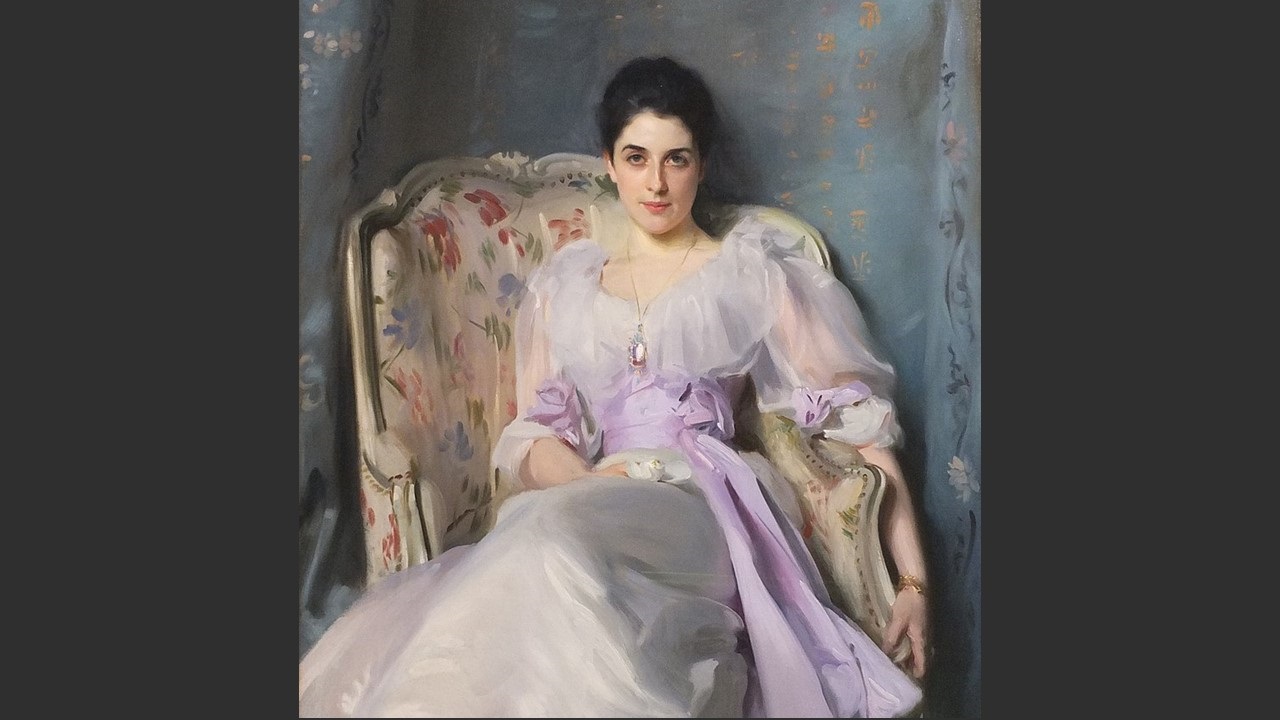.
Lady Agnew of Lochnaw, Loved by
the Viewer and the Baronet
The lady wanted prettiness and style.
(The artist wanted pounds.) The chintz
Gave both her wants. A “quizzical half-smile”
Invites a conversation, or it hints
At that. Chiffon hides shoulders, who knows why?
Her breasts are also secret underneath
Its gauziness. From each dark, glinting eye
A depth of prettiness proceeds. The sheath
Of satin wraps around her waist. She holds
A flower, it seems, a swishingness of white.
This prettiness perhaps is linked to folds
Of suaveness, silken freedom, nothing tight.
_Then almost hidden till you notice comes
__The lavender of valentine. That thrums.
.
.
Phillip Whidden is an American living in England who has been published in America, England, Scotland (and elsewhere) in book form, online, and in journals.















This is a fine example of an ekphrastic poem — one that takes as its subject a pre-existing work of art and describes it and meditates on it. The locus classicus for the genre is the description in the Iliad of the shield of Achilles fashioned by the god Hephaistos. But any real or imagined work of art can be the subject — a statue, a painting, a lovely vase, a building, or in some cases a piece of music.
One minor criticism: There’s foot missing in line 2. Perhaps if “pounds” were replaced by the trisyllabic “sovereigns” it would be fixed, though even in the U.K. today I think very few people even remember that “sovereigns” were gold coins.
Thank you very much, Joseph S. Salemi, both for the praise and for the corrective comment. I’ll rewrite the line following your lead. I’ll have to change “pounds” to “sovereign’s gold” to get enough syllables properly into the line. This will be slightly unfortunate since the humor in the parentheses comes from the baldness of “pounds.” (A personal friend laughed over the original there.) But, yes, the purity of scansion is what you and I want.) I think I can’t make the correction here on the website above. For some reason the website’s messaging system is not informing me when you or other react to the sonnet. People who do not know what sovereigns were can look up the word on the now sovereign world wide web.
What a wonderful ekphrastic poem. I cut and pasted them side by side on a Word document for greater effect when reading. The pale complexion the Scots are famed for is clearly visible in Lady Agnew’s arms, neck and face.
Great stuff, Phillip.
Thank you, Paul A. Freeman. You will see that Joseph S. Salemi has rightly suggested the metrical problem in line 2 needs to be corrected. I very much agree. I will make the correction (see the two messages above yours) but I’ll have to make it on my own website and on my own computer. I’m touched that you put in some work to make a document more suitable to your needs. Personally I have trouble seeing the lavender valentine referred to in the sonnet when I examine the illustration. It’s just too small to let me see the valentine. No, I am not complaining about the small size of the illustration.
Hi, Phillip. Yes, I noticed the ‘pounds’ problem, too. If you want to keep the word, you could always opt for ‘sterling pounds’.
Thanks very much, Paul A. Freeman. I like your suggestion, too. Both yours and his take away the rudeness of bald “pounds.” I’ll have to ponder. My Ukrainian neighbor lady is baking me a pumpkin pie tomorrow. I didn’t even have to ask her to do it. Some people are the sort we should be thankful for. Happy Thanksgiving.
Such perfection describing how the lady is “loved by the viewer”! You, Phillip, encourage the reader to look for still more details. The wristwatch, for example. I admit I do not see the valentine (which apparently displays the baronet’s love), but if your minute observation says so, it’s there. “Prettiness and style” of the lavender sash pulls color from the chintz into the foreground. And you haven’t even mentioned the portrait of a lady in white on the cameo, centered in gauziness–though words point delicately in that direction.
Since you are musing over your wish to keep “pounds” plain, why not do so by adding a two-syllable adjective before “artist”? Pounds bare, and meter as perfect as the description.
First, Margaret Coats, please accept my delay in replying. I have been offline due to a software glitch. Thank you for your praise of the poem. Thank you for looking very closely at the image of the painting. Yes, there are other lovely details I did not fit in to the sonnet. The valentine is dark purple on part of the fluff around her left sleeve, though, yes, very small. How about “The Yankee artist wanted pounds.” Thanks for your suggestion.
“Yankee artist” sounds perfect, Phillip. By emphasizing his pecuniary need as foreigner with fewer resources than a British painter might have had, you give him a strong motive to create a stunning portrait, and at the same time suggest that Lady Agnew’s beauty would shine brilliantly regardless of the artist or his motive.
Margaret Coats, I have now rewritten the troublesome line on my website using our agreed improvement about “Yankee artist”. Thank you again.
Dear Margaret Cross, Thank you for tacitly accepting my apology. I’m glad we are agreed about the phrase “Yankee artist.” I suggest that you might want to read the most appropriate article in Wikipedia about her, the painting and John Singer Sarget. https://en.wikipedia.org/wiki/Lady_Agnew_of_Lochnaw .
I am embarrassed to say that I did not read it myself till this evening. I hope that some day you can experience the painting yourself.